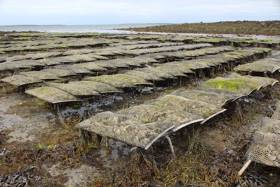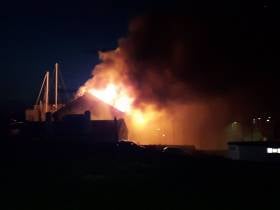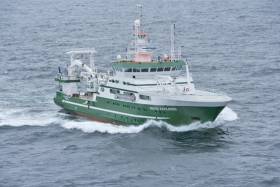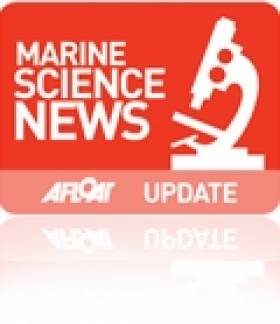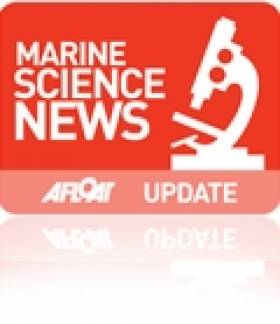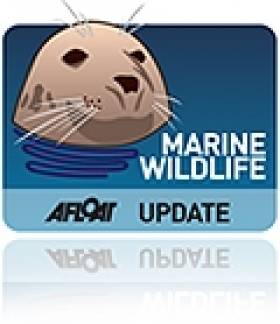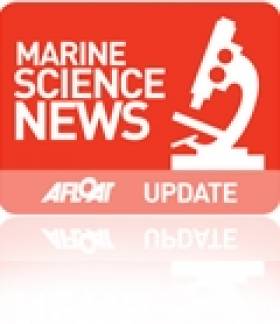Displaying items by tag: workshop
Interactive Game Workshop to Highlight Impact of Climate Change on Migratory Fish
This Thursday 2 March, Inland Fisheries Ireland (IFI) in Waterford is hosting a workshop with a twist — to play a serious game called DiadESland, about managing diadromous fish species.
DiadESland is an interactive role-playing engagement tool developed through the Interreg DiadES project. It gives stakeholders and managers an opportunity to discuss the impact of climate change on migratory fish, rivers and catchments through an imaginary environment.
Participants will team up and play the role of catchment managers, making management decisions to achieve a set of goals for their catchment.
It is an excellent opportunity for networking in an informal setting but with an important objective: to discuss the serious issues facing diadromous fish species in the context of climate change.
This session will also allow IFI to discuss future strategies and management recommendations.
EU Interreg AA funding allows for providing players with a fully catered workshop, and travel costs will be refunded (as required).
There is no requirement for expertise in fish or fish management to play the game and all sectors involved with fish management or commercialisation are warmly invited.
Embracing connectivity is the theme of the third Pillar I workshop for the Atlantic Action Plan: ports as gateways and hubs for the blue economy.
Connectivity: Staying Connected for Trade, Tourism and Economic Growth takes place online on Thursday 16 September from 9.30am to 12.15pm IST. See the workshop agenda HERE.
The workshop will be examining the significance of connectivity in promoting trade, tourism and economic growth in the maritime transport sphere.
It will focus on the Atlantic area and highlight post-Brexit issues, digitisation, the growing importance of regional ports and regional development in general.
To take part, complete the registration form by Tuesday 14 September.
Digitisation of port operations is the topic of the first in a new series of three workshops under Pillar I of the Atlantic Action Plan: ports as gateways and hubs for the blue economy.
The Current Status and Future Direction of Digitalisation in Ports in the Atlantic Sea Basin will take place this Wednesday 12 May from 9.30am to 12.45pm GMT. See the workship agenda HERE.
Digitalisation is of key importance for the future growth, sustainability and efficiency of the maritime industry. As part of this workshop, a panel of industry experts will discuss best practices of existing projects, with a focus on the user perspective.
The workshop will also seek to address the potential of future technologies to positively impact connectivity and facilitate trade.
Workshop Hears Latest Research On Shellfish Safety
More than 90 shellfish producers and processors, scientists, agencies and stakeholders attended the 11th Shellfish Safety Workshop earlier this month to discuss the latest advances in the field in Ireland.
The workshop, which took place on Tuesday 8 October in the Radisson Blu Hotel Athlone, was hosted by the Marine Institute and co-sponsors Food Safety Authority of Ireland, Sea Fisheries Protection Authority and Bord Iascaigh Mhara.
The event offered an opportunity to exchange information on the latest research and information on the cause and control of shellfish products harvested and farmed around Ireland's coast.
Speakers included Dr Conor Graham, of GMIT Marine and the Freshwater Research Centre, on the development of the world’s first scientific-based shellfish traceability tool, as previously reported on Afloat.ie.
Other speakers included Dr Monika Dhanji Rapkova, of the Centre for Environment, Fisheries and Aquaculture Science, on the learnings on regulated and emerging biotoxins in British shellfish.
Dr Eileen Bresnan (Marine Scotland Science) presented a talk on the regional distribution of harmful algal events in North Atlantic Area. Dave Clarke of the Marine Institute also talked about the insights and perspectives on monitoring algal and biotoxin events in Irish coastal waters from the past 20 years.
Micheál O'Mahony of the Sea Fisheries Protection Authority presented on the recently published European baseline survey of norovirus in oysters, while Dr Sinéad Keaveney (Marine Institute) discussed the survey in the Irish context.
There were also a series of flash presentations from representatives of the Marine Institute, Bord Iascaigh Mhara, Sea Fisheries Protection Authority, Food Safety Authority of Ireland, Dublin City University, Sligo Institute of Technology and Health Services Executive.
The proceedings of the workshop are currently being compiled for publication and in the coming weeks will be available for download from the Marine Institute’s Open Access Repository.
Crews in Wales Fight 'Devastating' Fire on Holyhead Marina
#CoastalNotes - In north Wales, fire crews BBC News reports have been fighting a large blaze at a workshop on Holyhead Marina.
An eyewitness said "30ft high flames" were coming out of the roof of a marine engineering workshop after reports of an "explosion" on social media.
North Wales Fire Service had four crews tackling the fire on Anglesey, which started at about 21:10 BST on Thursday.
Ynys Mon MP Albert Owen tweeted there were "no reported injuries" and the area around the Holyhead RNLI station was evacuated as a precaution.
"Emergency services have the matter under control," he added.
Holyhead Port, one of the UK's busiest ports with daily ferries to the Republic of Ireland, said the fire was not affecting its operations.
The Welsh Ambulance Service said it had been made aware of the fire but paramedics were not required.
The fire service confirmed the blaze had been brought under control by 23:30.
For more on the incident, the BBC has more by clicking here.
Research Vessel Users Workshop In April
#MarineScience - The research vessel operations team at the Marine Institute are hosting a workshop for research vessel users at the institute's Oranmore headquarters on Thursday 28 April.
The aim of the workshop is to give marine scientists across a range of disciplines the opportunity to discuss their research, and their experience on both the RV Celtic Explorer and RV Celtic Voyager, as well as using the ROV Holland 1.
It will also allow the research vessel operations team to highlight the capabilities of both research vessels post 2015 refits, and to gather feedback about how the service could be improved.
The meeting will commence at 9am and it is planned to finish at 6pm. There will be an opportunity to have a Q&A session around the talks and gather feedback from both the user and the service provider. Contact [email protected] with any queries.
The research vessel users workshop will be followed by a SMARTSkills day workshop also in Oranmore on Friday 29 April with training sessions on the following:
- MaxSea plotting software.
- Shipboard Computer System (SCS) training.
- IxBlue Echoes Sub Bottom Profiler training: practice and processing.
- CTD training.
- ADCP training.
- Kongsberg Multibeam operating system (SIS).
All of the above equipment will be available for hands-on training and there will also be a wide selection of other scientific equipment on display on the day. See the SMARTSkills website for further information. A draft agenda for the SMARTSkills training can be found HERE.
Register For SMARTSkills Workshop On Research Funding And Marine Data
#MarineScience - The SMARTSkills 2013 Postgraduate Workshop on Research Funding Opportunities and Marine Data Access will be held on the 24 and 25 October 2013 hosted by the Marine Institute in Oranmore, Galway.
The two-day workshop is organised by the Strategic Marine Alliance for Research and Training (SMART) and is sponsored by Galway-Mayo Institute of Technology (GMIT), and aims to support postgraduate researchers by providing practical, concise information on accessing research funding and marine data sets, two topics identified as essential for emerging marine researchers.
Day one of the workshop will focus on funding mechanisms, researcher mobility, careers and access to infrastructure and training.
Speakers are drawn from a wide range of scholarship and research organisations including the Higher Education Authority, Erasmus Mundus, AquaTT, Science Foundation Ireland, Irish University Association, Enterprise Ireland, Marie Curie, Euraxess, European Research Council and UCD Innovation Academy, along with a number of research funding programmes including Horizon 2020 and Interreg V.
The second day will address how to access and mine the huge variety of marine biological, oceanographic, environmental and ocean energy-related datasets and model outputs available.
National and International marine data experts will present on online data portals and datasets including SeaDataNet, My Ocean, PlanktonNet, EMODNet, INFOMAR, MIDA, ICAN and ICES. The topic of data management will also be examined with a focus on formatting, metadata and archiving data.
SMARTSkills will also serve as a networking and social opportunity and facilitate marine researchers in communicating their research with potential future collaborations. All attendees are therefore also requested to give a two-minute flash presentation on their research.
The workshop is open to all postgraduate students of marine science, technology and engineering from across the island of Ireland.
The SMART postgraduate workshop is free to students from all member institutes. A registration fee of €75 is payable by students from institutes not involved with the SMART consortium, although some scholarships are available.
SMART partners include: Athlone Institute of Technology (AIT); Galway Mayo Institute of technology (GMIT); Marine Institute (MI); NUI Galway (NUIG); University College Cork (UCC) and University of Ulster (UU).
All prospective attendees register online before tomorrow Friday 18 October. Registration and further information is available HERE. For any further queries contact the SMART team at [email protected].
Galway Hosts Shellfish Safety Science Workshop
#MarineScience - The 10th Shellfish Safety Science workshop will take place at the Marine Institute in Galway on Thursday 18 April 2013.
This one-day event is an opportunity for anyone working in the area of shellfish safety, including regulators, scientists as well as industry, to meet and exchange information on the latest advances in the field.
Irish regulatory agencies will provide updates on recent shellfish biotoxin, toxin-producing algae, harmful algal blooms and shellfish microbiology.
There will be presentations from research projects that are nearing completion on the toxicology and causative organism responsible for Azaspiracid shellfish poisoning which caused extensive economic hardship in 2012 and 2013.
A new EU project using advanced satellite imagery, mathematical modelling and real-time monitoring to provide short-term predictions will be demonstrated, showing how this multidisciplinary approach may provide useful information on biotoxin outbreaks for shellfish producers.
On the microbiological side, presentations on shellfish contamination from Norovirus and how the Shellfish Waters Directive aims to monitor and improve environmental conditions for shellfish cultivation will be given.
Further information on these and other aspects of the workshop are available on the Marine Institute website at www.marine.ie. Attendance is free but registration is required by emailing [email protected].
Northern Ireland Marine Bill Discussed at Special Workshop
#MARINE WILDLIFE - A meeting of the Northern Ireland Marine Task Force (NIMTF) last week brought together interests from across the spectrum to discuss the new Marine Bill and ensure it will "deliver for all sea users".
The workshop at Castle Espie on Strangford Lough last Thursday 22 March saw politicians sit down with environmentalists, fishermen and wind farm developers, and engage with those responsible for drafting the proposed legislation.
According to a statement from the Ulster Wildlife Trust, which is a member of the NIMTF, the bill "provides for the creation of a network of marine protected areas to protect marine wildlife" as well as a roadmap for a more joined-up approach to the North's marine resources.
NIMTF spokesperson Ricky Devlin said: "We now need to ensure that [the bill] addresses the full range of environmental, recreational and commercial interests such as fishing, diving, electricity generation and aquaculture."
A full report of the meeting will be available shortly from www.nimtf.org
Marine Institute to host ARCOPOL Oil Spill Modelling Workshop
The Marine Institute will be hosting an ARCOPOL oil spill modelling workshop in Galway on Tuesday 13 September.
This one-day workshop is an opportunity to discuss the development of common procedures, techniques and decision tools for the management of response to oil spills and other hazardous and noxious substances.
The event is being held at the Marine Institute, Rinville, Oranmore, Co Galway under the auspices of the EU Interreg Atlantic Area Project ARCOPOL, in which the Marine Institute is a participant.
For detailed information see the agenda which is available to download HERE.
All relevant professionals are invited; attendance is free but limited on a first-come-first served basis. Registration is mandatory by e-mail to [email protected].


























